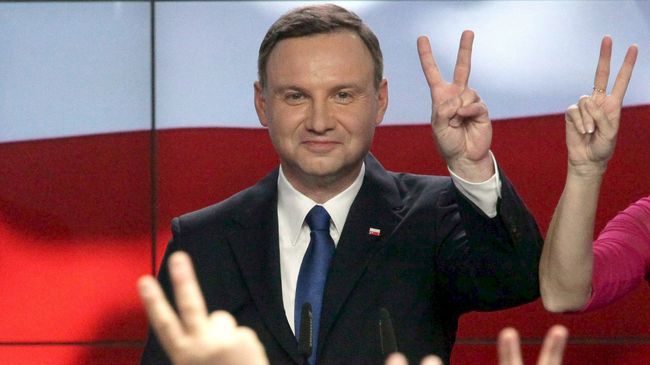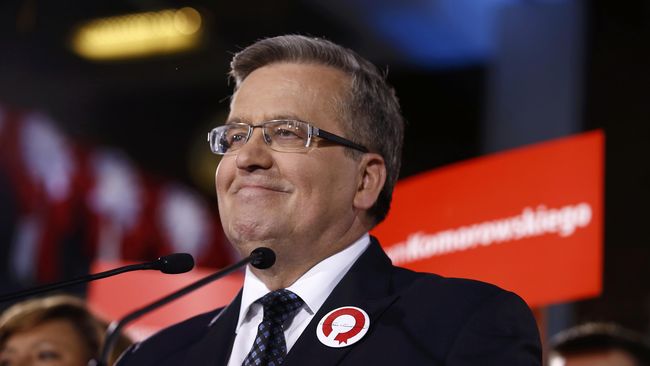“Yellow Card” for Komorowski
Andrzej Duda, who advocates sending Polish troops to Donbas, has won the first round of presidential election in Poland
The British and Polish voters have prepared some nasty surprises for Putin. And this was not the best backdrop for the rise in hysteria on the May 9 celebrations. Recently, the Tories led by the incumbent PM David Cameron have claimed victory on the parliamentary elections in the UK.
Having won a popular support, Cameron will undoubtedly try to strengthen the UK’s role in the European affairs. And that includes Ukrainian question.
And neither the Polish presidential election was supposed to bring good news to Moscow. All they had to hope was that Bronislaw Komorowski, the incumbent president, would win the first round and then in the inevitable second, using that victory as a springboard. But here Polish voters brought down the hopes of Kremlin.
FIRST, the incumbent president has squandered his initial 60 percent voter support at the start of the campaign to 33.77 percent. On the other hand, Andrzej Duda, his principal opponent, managed to boost his 16-18 percent rating to 34.76. The difference in numbers between the opponents is a mere 0.99 percent. However, the dynamics of the election process, as well as psychological factors, have to be taken into account. Komorowski has only been losing his ground, while Duda, on the contrary, has been increasing his popularity.

REUTERS photo
SECOND, the presidential election is a prelude to the upcoming parliamentary, which will take place in autumn. The winner of the second round will secure significant advantages for his party. Though this factor was not very apparent during the presidential, the Civic Platform and Law and Justice (PiS) rival parties (the former supporting Komorowski and the latter Duda) have fought with an eye on September.
Note that the local elections past fall were also lost by Civic Platform. It was a sign of danger, but it seems that the necessary conclusions have not been made – and so the party has just received the second yellow card.
THIRD, though foreign policy and national security issues have found their way on the election agenda, the Polish voters seem seriously concerned with economic and financial problems. Over the past ten years hundreds of thousands Polish citizens have emigrated to the UK and Germany. The average unemployment rate is 8 percent, but it is more than 20 for young people. Public discontent with the economy results in the support of the openly populist Pawel Kukiz, former musician. He came third, receiving one-fifth of the overall vote.
The voters of Kukiz are primarily young people and students who prefer the so-called non-system candidates. And their votes will decide who wins in the second round on May 24.
FOURTH, the tactics of Jaroslaw Kaczynski, leader of PiS, has paid off. His figurehead was virtually unknown, but very attractive young politician – and he, moreover, had received the blessing of the influential Catholic Church. The new face and the hope for changes brought in many conservative voters. And yet the second round of elections on May 24 is completely unpredictable. Voter turnout will decide everything. So far it has been low (only 49.4 percent of voters attended the first round), and the situation favored the national conservative PiS party.
FIFTH, the politicians who voiced solidarity with Moscow have scored only 7 percent in all. Magdalena Ogorek, representative of Democratic Left Alliance who had declared her intention to meet with Vladimir Putin immediately after inauguration, stood out of all the pro-Russian candidates. However, according to Euronews, this young former blonde model lacks experience and integrity in her political course. Thus, her result was a little less than 2.5 percent.
Meanwhile, KORWiN party candidate Janusz Korwin-Mikke opposes US meddling in the European countries’ affairs and acknowledges Crimean annexation by Russia. Janusz Palikot, another pro-Russian candidate, does not approve sanctions against Russia and the increase in military budget. The former got 3.5 percent of votes, the latter – only about 1.5 percent.
The president of Poland has some fairly limited powers according to the constitution, primarily in the domain of foreign policy. However, taking into account the psychological impact on the September parliamentary, the possible outcome of the second round presidential election should not be underestimated.
As of the Ukrainian question, one should not expect drastic changes in the Polish policy. Both Komorowski and Duda voiced their support to Kyiv. The latte – at least in words – sounded even more determined. In January Duda stated that he would consider sending Polish military to Donbas in order to help Ukrainian soldiers. But Komorowski is trying to keep up. In particular, he has promised to initiate a referendum on changing the election system and prohibiting political party funding from the state budget.
Surely, in this moment of time, such statements are only regarded as a pre-election rhetoric. However, the strengthening of PiS national-conservatives might mean stronger support for Ukraine – and possibly not just purely diplomatic one.
The political configuration in Poland will become clearer only after the parliamentary election. We can only wait.
Newspaper output №:
№29, (2015)Section
Topic of the Day





